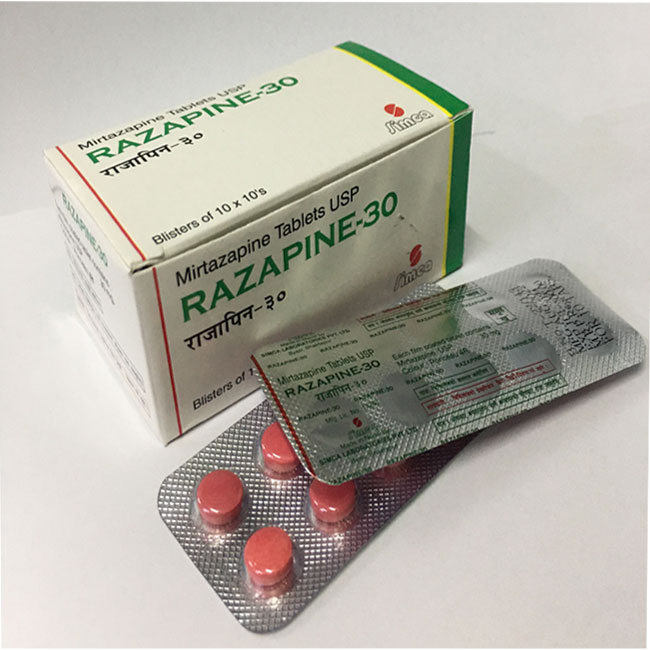Razapine
Generic composition: Mirtazapine
General Description
Mirtazapine is a tetracyclic piperazino-azepine antidepressant agent
Therapeutic category
- Atypical Anti-depressant
Dosage forms available
- RAZAPINE 7.5mg Tablets
- RAZAPINE 15mg Tablets
- RAZAPINE 30mg Tablets
Mechanism of action
Mirtazapine enhances central noradrenergic and serotonergic activity. Mirtazapine acts as an antagonist at
central presynaptic α 2 adrenergic autoreceptors and heteroreceptors, an action that is postulated to increase in
central noradrenergic and serotonergic activity.
Mirtazapine is a potent antagonist of 5-HT2 and 5-HT3 receptors. Mirtazapine has no significant affinity for the 5-HT1A and 5-HT1B receptors. Mirtazapine is a potent antagonist of histamine (H1) receptors, a property that may explain its prominent sedative effects.
Mirtazapine is a moderate peripheral α1 adrenergic antagonist, a property that may explain the occasional orthostatic hypotension reported in association with its use. Mirtazapine is a moderate antagonist at muscarinic receptors, a property that may explain the relatively low incidence of anticholinergic side effects associated with its use.
Pharmacokinetics
Absorption: absorption is rapid and complete, bioavailability is 50% due to first pass metabolism, peak concentration reaches after 2 hours of administration, and food has little effect on drug absorption, about 85% protein bound.
Distribution: volume of distribution after an oral steady-state dose was measured to be 107 ± 42L
Metabolism: extensively metabolized in liver by demthylation and hydroxylation, glucuronide conjugation.
Elimination: excreted by kidney; 75% eliminated in the urine and 15% eliminated in the feces.
Half-life: 20-40 hours
Uses
- Major depressive disorder
- Mood disorder
- Anxiety disorder
Dose
- 15 mg/day, administered in a single dose, preferably in the evening prior to sleep.
- Initial 15-mg dose may benefit from dose increases up to a maximum of 45 mg/day.
- The effective dose range was generally 15 to 45 mg/day.
Side effect
Increase in appetite and weight, nausea, drowsiness and sedation are common. Orthostatic hypotension, dry
mouth, constipation, nightmares, confusion, myalgia, anthralgia, tremor, edema.
Contraindications
- Use with MAO Inhibitors
- Hypersensivity to Mitrazapine
Precaution
- Gradual withdrawal
- Hyponatremia
Drug interaction
- MAO Inhibitors, serotonergic drugs
- Cimetidine
- Clonidine
- Alcohol


